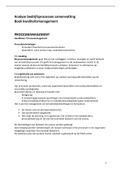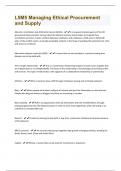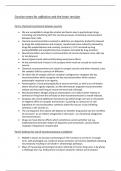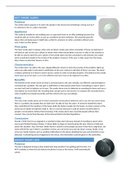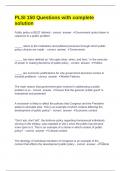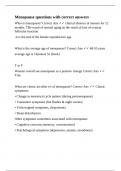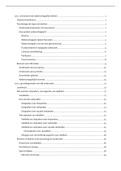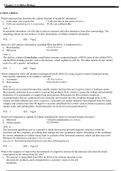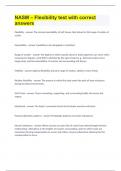PSYC 3775 Personality Theory
Week 1:
1. Heuristic value
2. Falsifiable
3. Organizes Known Data
Readings: 4. Applied Value
The Stranger- Albert Camus 5. Internally Consistent
Feist 2021 Chpt. 1 Edition 10th 6. Parsimonious
What is Personality?
Heuristic value: Essentially, when one is referring to a
theory’s heuristic value, it is whether it generates
further study, discussion, expansion, or research.
Definition Quotes: Falsifiable: Is the theory verifiable, can it be tested, and
are the ideas able to be operationalized?
"Personality is the dynamic organization within the
individual of those psychological systems that determine Organizes Known Data: A good theory will be able to
the individual’s unique adjustment to integrate what is known about personality from the
their environment" (Allport, 1937). research literature, from the clinical literature, and
"Personality represents an evolving process subject to a other information/observations about personality from
variety of internal and external influences, around the globe into a single framework.
including genetic and biological propensities, social
Applied Value: Ideally, a good theory of personality will
experiences, and changing environmental
have some usefulness! It should be able to guide
circumstances" (Hjelle & Ziegler, 1992).
research as well as serve as a tool for clinicians.
"Personality is the relatively enduring
pattern of recurrent interpersonal situations, which Parsimonious: The final criterion, if all other criteria are
characterize a human life” (Sullivan, 1953). met, is parsimony—simplicity.
"No substantive definition of personality can be The two MOST important functions of a theory are its
applied with any generality. Personality is defined by ability to generate research and organize observations.
the Internally Consistent: Part A and Part B of a theory
Part of the internal consistency of a theory is a set of
should not disagree or contradict each other. empirical
operational definitions.
concepts, empirical the theory of personality employed
by the observer" (Hall & Lindsey, 1970). What Questions Does Personality Theory Seek to
Most psychologists would agree that personality: Examine?
can possibly be explained by several different Determinism vs. Free Choice/Will
theories.
Pessimism vs. Optimism
What is Theory?
Conscious vs. Unconscious determinants of behavior
Theories “set of assumptions that allows scientists to use
logical deductive reasoning to formulate testable Biological vs. Social influences
hypotheses.” Uniqueness vs. Similarities
, PSYC 3775 Personality Theory
Importance of hedonism Within these levels mental live are the provinces of the
mind: id, ego, and superego. Instincts: Instincts are
Relation of learning to personality
Freud’s most parsimonious concepts!
Importance of genetic or hereditary factors
Importance of early developmental experience
Continuity vs. discontinuity of behavior
The extent to which theory embraces holistic principles.
Importance of psychological environment--the
subjective frame of reference
Role of self-concept
Role of cultural influences
Role of interdisciplinary anchoring
Role of evaluative or normative aspects of behavior
Id: We are born with our id. It is the unconscious part of
Relevancy to the description of abnormal or pathological our personality that contains our basic instincts (e.g., life
behavior instincts)
Sigmund Freud Theory Freud claimed that pleasure-seeking people with no
thought of what is reasonable or proper are dominated
by the id.
Ego: The ego develops later during the anal stage of
development. It endeavors to balance the needs of the
real world with the wants of the id (and later with the
demands of the superego).
In psychoanalytic theory, unacceptable drives and
impulses are repressed by the ego at the urging of the
superego.
Superego: The superego is the moral arm of our
personality. It serves the idealistic principle and is
divided into two subsystems.
Freud held that ideas in the preconscious originate from Freud's notion of the superego includes a conscience and
both the conscious and the unconscious. ego-ideal.
Unconscious: According to Freud, the unconscious
mind consists of all the drives, instincts, and anxiety-
ridden experiences repressed from memory that exist
outside of our awareness.
Preconscious: Freud argued that the preconscious
consists of elements that are not immediately in our
awareness but which we can pull into awareness with
varying levels of ease.
Dynamics of Personality
Conscious: Freud thought that consciousness was the
level of the psyche within our awareness. Instincts: Instincts are Freud’s most parsimonious
concepts.
Week 1:
1. Heuristic value
2. Falsifiable
3. Organizes Known Data
Readings: 4. Applied Value
The Stranger- Albert Camus 5. Internally Consistent
Feist 2021 Chpt. 1 Edition 10th 6. Parsimonious
What is Personality?
Heuristic value: Essentially, when one is referring to a
theory’s heuristic value, it is whether it generates
further study, discussion, expansion, or research.
Definition Quotes: Falsifiable: Is the theory verifiable, can it be tested, and
are the ideas able to be operationalized?
"Personality is the dynamic organization within the
individual of those psychological systems that determine Organizes Known Data: A good theory will be able to
the individual’s unique adjustment to integrate what is known about personality from the
their environment" (Allport, 1937). research literature, from the clinical literature, and
"Personality represents an evolving process subject to a other information/observations about personality from
variety of internal and external influences, around the globe into a single framework.
including genetic and biological propensities, social
Applied Value: Ideally, a good theory of personality will
experiences, and changing environmental
have some usefulness! It should be able to guide
circumstances" (Hjelle & Ziegler, 1992).
research as well as serve as a tool for clinicians.
"Personality is the relatively enduring
pattern of recurrent interpersonal situations, which Parsimonious: The final criterion, if all other criteria are
characterize a human life” (Sullivan, 1953). met, is parsimony—simplicity.
"No substantive definition of personality can be The two MOST important functions of a theory are its
applied with any generality. Personality is defined by ability to generate research and organize observations.
the Internally Consistent: Part A and Part B of a theory
Part of the internal consistency of a theory is a set of
should not disagree or contradict each other. empirical
operational definitions.
concepts, empirical the theory of personality employed
by the observer" (Hall & Lindsey, 1970). What Questions Does Personality Theory Seek to
Most psychologists would agree that personality: Examine?
can possibly be explained by several different Determinism vs. Free Choice/Will
theories.
Pessimism vs. Optimism
What is Theory?
Conscious vs. Unconscious determinants of behavior
Theories “set of assumptions that allows scientists to use
logical deductive reasoning to formulate testable Biological vs. Social influences
hypotheses.” Uniqueness vs. Similarities
, PSYC 3775 Personality Theory
Importance of hedonism Within these levels mental live are the provinces of the
mind: id, ego, and superego. Instincts: Instincts are
Relation of learning to personality
Freud’s most parsimonious concepts!
Importance of genetic or hereditary factors
Importance of early developmental experience
Continuity vs. discontinuity of behavior
The extent to which theory embraces holistic principles.
Importance of psychological environment--the
subjective frame of reference
Role of self-concept
Role of cultural influences
Role of interdisciplinary anchoring
Role of evaluative or normative aspects of behavior
Id: We are born with our id. It is the unconscious part of
Relevancy to the description of abnormal or pathological our personality that contains our basic instincts (e.g., life
behavior instincts)
Sigmund Freud Theory Freud claimed that pleasure-seeking people with no
thought of what is reasonable or proper are dominated
by the id.
Ego: The ego develops later during the anal stage of
development. It endeavors to balance the needs of the
real world with the wants of the id (and later with the
demands of the superego).
In psychoanalytic theory, unacceptable drives and
impulses are repressed by the ego at the urging of the
superego.
Superego: The superego is the moral arm of our
personality. It serves the idealistic principle and is
divided into two subsystems.
Freud held that ideas in the preconscious originate from Freud's notion of the superego includes a conscience and
both the conscious and the unconscious. ego-ideal.
Unconscious: According to Freud, the unconscious
mind consists of all the drives, instincts, and anxiety-
ridden experiences repressed from memory that exist
outside of our awareness.
Preconscious: Freud argued that the preconscious
consists of elements that are not immediately in our
awareness but which we can pull into awareness with
varying levels of ease.
Dynamics of Personality
Conscious: Freud thought that consciousness was the
level of the psyche within our awareness. Instincts: Instincts are Freud’s most parsimonious
concepts.

